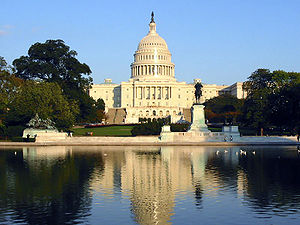アメリカ合衆国の共和主義
出典: フリー百科事典『ウィキペディア(Wikipedia)』 (2022/07/11 10:10 UTC 版)
| 政治シリーズ記事からの派生 |
| 共和主義 |
|---|
 |
| Portal:政治学 |
アメリカ合衆国の共和主義(英: Republicanism in the United States)は、その独立以来アメリカ市民思想の主要部分であり続けている政治的価値観である[1]。中心的な価値として「自由」と「不可分の権利」を強調し、人民全体を主権者とし、政治権力の世襲を拒否し、市民がその公民としての義務を行うときに独立であることを期待し、政治的腐敗を忌避している[2]。アメリカ合衆国の共和主義は18世紀に建国の父達によって基礎が造られ、初めて実行された。それは共和政ローマ、ルネサンス期および権利に関するイギリスのモデルと概念に基づいていた[3]。アメリカ合衆国においては、その独立と独立宣言(1776年)、アメリカ合衆国憲法(1787年)、さらにはゲティスバーグ演説(1863年)の基本になった[4]。
共和主義は、人民が多数意見によっても取り去ることができない不可分の権利を持っていると主張することで、他の民主主義形態とは異なっているということができる[5]。アレクシ・ド・トクヴィルは民主主義における「多数派の専政」について警告し、少数派の権利の弁護者は、多数派によって少数派の権利を停めるような事態を裁判所が覆すことでそれら権利を保護する必要があると警告してきた[6] 。
「共和主義」という言葉は「共和国」という言葉から派生しているが、この2つの言葉には異なる意味がある。「共和国」は政府の形態であり(世襲階級の無いもの)、「共和主義」は共和国にも君主国にも現れ得る政治思想である[7]。
アメリカ合衆国の歴史では、2つの政党が共和主義を表す名前を付けた。すなわちトーマス・ジェファーソンが1793年に設立した民主共和党と呼ばれたもの、および1854年に設立され現在も続いている共和党である[8]。
- ^ Robert E. Shalhope, "Toward a Republican Synthesis: The Emergence of an Understanding of Republicanism in American Historiography," William and Mary Quarterly, 29 (January 1972), 49–80
- ^ Richard Buel, Securing the Revolution: Ideology in American Politics, 1789–1815 (1972)
- ^ Becker et al (2002), ch 1
- ^ Gordon S. Wood, The Radicalism of the American Revolution: How a Revolution Transformed a Monarchical Society into a Democratic One Unlike Any That Had Ever Existed (1992).
- ^ John Phillip Reid, Constitutional History of the American Revolution (2003) p 76
- ^ Kyle G. Volk, "The Perils of 'Pure Democracy': Minority Rights, Liquor Politics, and Popular Sovereignty in Antebellum America," Journal of the Early Republic Volume 29, Number 4, Winter 2009 DOI: 10.1353/jer.0.0113
- ^ Hart, (2002), ch 1
- ^ Robert Williams, Horace Greeley: champion of American freedom (2006) p 175-6
- ^ Kenneth R. Bowling "A Capital before a Capitol: Republican Visions," in Donald R. Kennon ed. A Republic for the Ages: The United States Capitol and the Political Culture of the Early Republic (1999)
- ^ Trevor Colbourn, The Lamp of Experience: Whig History and the Intellectual Origins of the American Revolution (1965) online version
- ^ H. T. Dickinson, ed., A companion to eighteenth-century Britain (2002) p. 300
- ^ Mortimer N. S. Sellers, American republicanism (1994) p. 3
- ^ Robert Kelley, "Ideology and Political Culture from Jefferson to Nixon," American Historical Review, 82 (June 1977), 536
- ^ J.G.A. Pocock, The Machiavellian Moment p 507
- ^ Wood, Gordon (2011). The Idea of America. New York: The Penguin Press. pp. 325
- ^ Bernard, Bailyn. The Ideological Origins of the American Revolution. Cambridge, Mass: The Belknap Press
- ^ Bailyn, Bernard. The Ideological Origins of the American Revolution (1967)
- ^ Thomas S. Kidd, God of Liberty: A Religious History of the American Revolution p. 9
- ^ Kidd, God of Liberty, p 8
- ^ Bernard Bailyn, The Ideological Origins of the American Revolution p 525
- ^ Gordon Wood, "Introduction" in Idea of America: Reflections on the Birth of the United States (2011) online.
- ^ Bernard Bailyn, The Ideological Origins of the American Revolution p 92
- ^ Robert E. Shalhope, "Toward a Republican Synthesis," William and Mary Quarterly, 29 (January 1972), pp 49–80
- ^ “Thomas Jefferson to John Taylor, May 28, 1816”. 2006年10月31日閲覧。 See also: James Madison on Majority Government
- ^ Republican Government. Retrieved on 2006-12-14.
- ^ J.G.A. Pocock, "Virtue and Commerce in the Eighteenth Century," Journal of Interdisciplinary History 3#1 (1972), 119–34.
- ^ Adams quoted in Paul A. Rahe, Republics Ancient and Modern: Classical Republicanism and the American Revolution. Volume: 2 (1994) P. 23.
- ^ Adams 1776 quoted in Rahe, Republics Ancient and Modern 2:23.
- ^ "Rousseau, whose romantic and egalitarian tenets had practically no influence on the course of Jefferson's, or indeed any American, thought." Nathan Schachner, Thomas Jefferson: A Biography. (1957). p. 47.
- ^ Gordon S. Wood, "Rhetoric and Reality in the American Revolution," William and Mary Quarterly 23#1 (1966), pp. 3-32 in JSTOR
- ^ Rodgers (1992)
- ^ Gordon S. Wood, Empire of liberty: a history of the early Republic, 1789-1815 (2009) p. 214
- ^ Mark B. Brown, Science in democracy: expertise, institutions, and representation (2009) p 83
- ^ 憲法制定会議でアレクサンダー・ハミルトンは州の権力を劇的に小さくするよう提案したが、支持が得られず、その考えを捨てた
- ^ Alexander Keyssar, The Right to Vote: The Contested History of Democracy in the United States (2001)
- ^ Fawn Brodie, Thomas Jefferson (1974) p. 267
- ^ quoted in John C. Miller, Alexander Hamilton: Portrait in Paradox (1959) p. 320; online edition of Webster p. 332
- ^ Dublin, Strike of 1830
- ^ Richard J. Ellis and Michael Nelson, Debating the presidency (2009) p. 211
- ^ Paul F. Bourke, "The Pluralist Reading of James Madison's Tenth Federalist," Perspectives in American History (1975) 9:271-299
- ^ David Tucker, Enlightened republicanism: a study of Jefferson's Notes on the State if Virginia (2008) p. 109
- ^ “George Washington to James McHenry, September 30, 1798”. 2007年1月8日閲覧。 Transcript.
- ^ Paul S. Boyer, et al. The Enduring Vision (2010) vol 1 p 191
- ^ Recently Martin has argued that Madison showed his commitment to the popular element of popular government in the "Memorial and Remonstrance against Religious Assessments" (1785); Robert W. T. Martin, "James Madison and Popular Government: The Neglected Case of the 'Memorial'" Polity, Apr 2010, Vol. 42 Issue 2, pp 185–209
- ^ Garrett Ward Sheldon and C. William Hill Jr., The Liberal Republicanism of John Taylor of Caroline (2008)
- ^ David Brion Davis, Antebellum American culture (1997) pp 14-15
- ^ Kermit L. Hall and Kevin T. McGuire, eds. Institutions of American Democracy: The Judicial Branch (2005) p 404
- ^ R. Kent Newmyer, Supreme Court Justice Joseph Story: Statesman of the Old Republic (1985)
- ^ Stephen B. Presser, "Resurrecting the Conservative Tradition in American Legal History," Reviews in American History, Vol. 13#4 (Dec., 1985), pp. 526-533 in JSTOR
- ^ Randolph quoted in Banning (1978) p. 262. See Lawrence D. Cress, "Republican Liberty and National Security: American Military Policy as an Ideological Problem, 1783 to 1789." William and Mary Quarterly (1981) 38(1): 73–96. ISSN 0043-5597 Fulltext at Jstor
- ^ Samuel F. Scott, "Foreign Mercenaries, Revolutionary War, and Citizen-soldiers in the Late Eighteenth Century." War & Society 1984 2(2): 41–58. ISSN 0729-2473
- ^ Ricardo A. Herrera, "Self-governance and the American Citizen as Soldier, 1775–1861." Journal of Military History 2001 65(1): 21–52. ISSN 0899-3718 Fulltext in SwetsWise and Jstor
- ^ Bruce Clayton, ed. The Mind of the South: fifty years later (1992) p 70-71
- ^ Wood 1995
- ^ Thornton, Politics and Power in a Slave Society: Alabama, 1800–1860 (1981)
- ^ McPherson, Battle Cry of Freedom (1988) quote p 126
- ^ Lewis L. Gould, Grand Old Party (2003) p 14
- ^ Richard Jensen, "Democracy, Republicanism and Efficiency: The Values of American Politics, 1885–1930," in Byron Shafer and Anthony Badger, eds, Contesting Democracy: Substance and Structure in American Political History, 1775–2000 (U of Kansas Press, 2001) pp 149–180.online version
- ^ Alyn Brodsky, Grover Cleveland: a study in character (2000) p. 96
- ^ John Whiteclay II Chambers,To Raise An Army: The Draft Comes to Modern America (1987)
- ^ Gary Hart, Restoration of the Republic: The Jeffersonian Ideal in 21st-Century America (2002) p. 7; Michael Tomasky, "Party in Search of a Notion," The American Prospect (May 2006) online at [1] . James Patterson, "Modern Era" in Byron Shafer and Anthony Badger, eds, Contesting Democracy: Substance and Structure in American Political History, 1775–2000 (U of Kansas Press, 2001)
- ^ D. Michael Shafer, The Vietnam-Era Draft in Shafer, ed. The Legacy: The Vietnam War in the American Imagination (1990), 57–79.
- ^ Elizabeth Bumiller and David M. Halbfinger, "Military Service Becomes Issue in Bush-Kerry Race," New York Times, February 4, 2004
- ^ Alec M. Gallup and Frank Newport, The Gallup poll: public opinion 2004(2006) p. 83
- ^ Marvin Kalb and Deborah Kalb, Haunting Legacy: Vietnam and the American Presidency from Ford to Obama (2011) p. 220
- ^ 139 U.S. 449, (1891)
- ^ Herman Belz, Abraham Lincoln, constitutionalism, and equal rights in the Civil War Era (1998) p. 86
- ^ 高木八尺他、「リンカーン演説集」、第一次大統領就任演説、p101、岩波文庫、1957年
- ^ William Safire, Safire's Political Dictionary (2008) p 175-6
- ^ Yonatan Eyal, The Young America Movement and the Transformation of the Democratic Party, 1828-1861 (2007) p. 27
- ^ Charles O. Lerche, Jr., "Congressional Interpretations of the Guarantee of a Republican Form of Government during Reconstruction," Journal of Southern History (1949), 15:192-211 in JSTOR
- ^ "Suffrage" in Paul S. Boyer and Melvyn Dubofsky, The Oxford companion to United States history (2001) p. 754
- アメリカ合衆国の共和主義のページへのリンク
